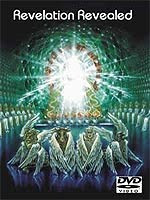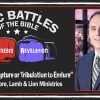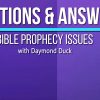The most frequently requested Christ in Prophecy television show episodes that people have asked be added to our Programs archives has been the series on Revelation. Well, the wait is over! Our media team dug deep into the vault, dusting off the shelf labeled “2003” and have encoded what many consider the best of “Christ in Prophecy” teachings.
Over the six episodes, Dr. David Reagan and guests Don McGee of Crown and Sickle Ministries and Dennis Pollock of Spirit of Grace Ministries go chapter by chapter through the book of Revelation, explaining that the book of Revelation isn’t difficult to understand, rather it is difficult to believe. But, if you will believe it for its plain sense meaning, you will understand it. For anyone who’s been born again and has the Holy Spirit residing within them, Revelation can become very clear.
We’ll reproduce this classic series here on The Christ in Prophecy Journal. We’ll begin with chapters 1-3 of Revelation, starting of course with chapter one. These three chapters constitute a fascinating introduction to the book. Then, everytime after a few chapters have been covered, the teachers will discuss various points of interest from the proceeding chapters.
Feel free to watch, listen, or read along by clicking one of the icons below.
Now, let’s begin our journey through the great book of Revelation!
Revelation Revealed: Chapter 1
[Read Chapter 1 in the NASB version via Biblegateway.]
Dr. Reagan: When studying the book of Revelation, most people seem to get bogged down in the details. And, tragically, they often focus on the Antichrist rather than Jesus Christ. In the process, they miss the big picture and the fundamental message. So, let’s go for the big picture and let’s seek the central Biblical message. Let’s engage in a sweeping overview of the book chapter by chapter.
The Title
As we begin with chapter one, let’s consider the name of the book. It is not the “Book of Revelations” plural. There are many revelations in it, but that’s not its name. If you have a copy of the Authorized King James Version, you will note that the title is stated as “The Revelation of John.” Well, that title is also incorrect. The proper title is the one contained in modern translations, “The Revelation to John.” It is not John’s revelation, it is the revelation or unveiling of Jesus Christ that was given to John by God the Father through Jesus. John refers to it in chapter one verse nine as “The testimony of Jesus.”
The Author
Now, who was this John? He does not clearly identify himself, but the testimony of all the early Church Fathers is that this was the Apostle John. All he says about himself is that he is a brother and fellow partaker in the tribulation and kingdom and perseverance which are in Jesus.
The Dating
It is interesting that John says he was a prisoner on the Island of Patmos. His imprisonment there is one of the clues to the dating of the book around 95 A.D., because that was when the Roman Empire turned against the Church. This happened because the Empire declared Caesar to be God. And, every person in the Empire was required once a year to go before a Roman magistrate and declare, “Caesar is Lord.” Well, no Christian could do that, and therefore Christians were considered enemies of the Empire. The result is that they became the target of terrible persecution.
The Setting
John tells us something very important in verse ten here, he states that he was “in the Spirit on the Lord’s Day.” Now, I don’t think John is referring to Sunday here. I think he was referring to what the Hebrew prophets called “The Day of the Lord,” which was a term for the end times. So, I believe John is telling us that “in the spirit” he was catapulted forward to the Day of the Lord — to the end times — and given a preview of what will happen when the Church Age comes to a close.
The Purpose
John was about 95 years old when this book was written. He was the only Apostle left alive. The thing that you need to keep in mind is that by the time this book was written, the persecution of Christians had become so terrible that it is evident from the Book of Revelation that many were wondering if the Church would really continue to exist. They were beginning to have second thoughts, wondering if Jesus really was who He said He was, wondering if Jesus really cared for them, wondering if He really meant it when He said, “Upon this rock I will build My church and the gates of Hades will not overpower it.”
The Church needed encouragement, and that’s really one of the main purposes of the book. It is designed to give encouragement and comfort to those who are suffering terribly. For that reason, the book of Revelation has always been a book that has given tremendous comfort to anyone going through persecution or suffering, whether it be individual, family, or national in nature.
The Hero
The book begins therefore with a tremendous vision of Jesus Christ the Glorified One. He is victorious over death, and the heavenly glory which He surrendered when He came to earth has been restored. John sees Jesus resurrected and glorified. Keep in mind that this is 65 years after the death, burial, and resurrection of the Lord. Jesus has returned to give the Church a second touch, a touch of encouragement. He has returned to say, “Yes, I care. Yes, I love you. I know what’s going on. I’m walking among you.”
John proceeds to describe Jesus in His glorified form. He sees Jesus dressed as a Priest because that’s what Jesus is now. He is our High Priest before the throne of God, our Mediator before God. John sees Jesus with white hair, which indicates His purity and wisdom. His eyes, feet and voice are all presented as symbols of judgment because all judgment has been given to Him by the Father. He has stars in his right hand, which are the angels, or messengers of the churches, showing that He cares for those churches and their pastors. He’s walking among seven golden candlesticks, which we’re told in verse 20 represent churches. They represent all of the churches, and through this image the Lord is trying to give to John and the church the message that He is walking among them, that He cares about them, and that He loves them. He is not some distant and impersonal God who is aloof and uncaring.
John is so overcome by this glorious vision of His resurrected and glorified Lord that he falls at Jesus’ feet as if dead. Jesus responds with one of the most comforting statements in all the Word of God: “Do not be afraid. I am the first and the last. I am the living one. I was dead, and behold I am alive forevermore and I have the keys of death and of Hades.” Jesus is saying, “I am the beginning of history, the end of history, and the meaning of history. I am in control of history and I have power over life and death.” Again, Jesus’ appearance and words are intended to reassure a church that’s under severe persecution. The hearts of first Century Christians, including John’s, must have been greatly encouraged even as Christians today are encouraged by these words.
In the next part on this series on Revelation, we’ll look at chapters 2-3 and Jesus’ special messages to the churches.
Resource
 Revelation Revealed DVD Revelation Revealed DVDUnderstand the book of Revelation! Revelation Revealed is a 75-minute survey of the entire book of Revelation and is full of charts, maps, pictures, historical footage and video animations. Order your copy today! |










a coupla things,1)did you know most of revelations prophecies,including alot of the judgements are found elsewhere in the bible?2)i did some research and i`m not sure i agree the"lords` day" is the day of the Lord. he would have stated it that way. some translations translate the 1st day of the week as "the lords day" in 1cor.
in 1cor 16:2 "on the 1st day of the week let each of you lay aside…"some versions say :on the lords day…"while i`m not dogmatic i think john was worshipping on a sunday. could be wrong tho
With this from FOX News "President Obama is facing criticism for his declaration over the weekend that he would seek a new "international order"…
Are we SURE this guy isn't the antichrist? (Rhetorical statement – just couldn't let this go by without comment).
Sounds very GB,Sr. We'll get a new "international order" when the Middle East realigns borders, most likely this summer.
True. I'm a Republican and I didn't like it when GB,Sr. said it either!
the last pro isreal president we had was reagan. not just GB sr but clinton and GB jr pushed for it as well.
Let's be careful not to look at the waves and keep our eyes on Christ. He's in control.
References to 1 Cor 16:12 refers to Saturday night ('the leaving of the Sabbath') since Jewush holidays begins at sunset. John was not worshipping on Sunday, He was Jewish and worshipped on Saturday (The Sabbath was created in the beginning, see Gen 2:3 and never changed, biblically. Jews were not allowed to carry money on the Sabbath.
I have to agree with hartdog, that I think it is a stretch to say the Lord's Day is the Day of Judgment, because in my research I found it hard to come up with that without twisting the scripture. Several of the commentaries that I looked at as well, agreed it is the first day of the week instead of the Day of judgment. thanks just sharing my concerns. Am learning lots from the blog and look forward to it but will continue to be Berean in that I don't just swallow everything I read but match it with the scriptures to see if it is true.
I would agree it is a stretch as well….I would say if they are willing to stretch on a matter such as that….be careful of what else.
A real lack of Care full ness!!